
CARNETS DE GEOLOGIE
metrics 2024
Innovating Knowledge in Geology and Beyond
Introduction
Carnets de Geologie is a prominent open-access journal dedicated to the dynamic fields of geology, paleontology, and stratigraphy. Published by Carnets Geologie and based in France, the journal has been a platform for scholarly communication since 2002, facilitating unrestricted access to high-quality research. With a robust impact reflected in its 2023 quartile rankings—Q2 in Geology, Paleontology, and Stratigraphy—Carnets de Geologie ranks favorably within Scopus, positioning itself at the 60th percentile for Earth and Planetary Sciences. The journal aims to disseminate innovative research findings and foster academic discourse among researchers, professionals, and students interested in the intricate aspects of Earth's history and processes. Encompassing a broad scope that reflects continuous developments in the geological sciences, Carnets de Geologie is dedicated to advancing knowledge and understanding within its community.
Metrics 2024
 0.44
0.44 1.50
1.50 1.10
1.10 20
20Metrics History
Rank 2024
Scopus
IF (Web Of Science)
JCI (Web Of Science)
Quartile History
Similar Journals
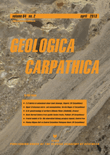
GEOLOGICA CARPATHICA
Illuminating Geological Insights for a Global AudienceGEOLOGICA CARPATHICA, with ISSN 1335-0552 and E-ISSN 1336-8052, is a distinguished open access journal published by the Slovak Academy of Sciences Geological Institute, serving as a pivotal platform for the dissemination of research in the field of Geology. Established in 1991 and continuing through 2024, the journal is recognized for its significant contributions to Earth and Planetary Sciences, evidenced by its 2023 Scopus ranking placing it in the second quartile (Q2) within Geology. With an H-index that showcases its impactful publications, GEOLOGICA CARPATHICA is committed to fostering scholarly communication while promoting accessible research, having adopted an open access model since 2009. Located in beautiful Bratislava, Slovakia, this journal aims to engage a global audience of researchers, professionals, and students interested in ecological, geological, and environmental studies, making it a prominent resource for enriching the scientific community's understanding of the Carpathian region and beyond.
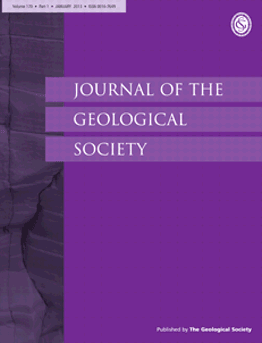
JOURNAL OF THE GEOLOGICAL SOCIETY
Pioneering Insights in Earth and Planetary SciencesJOURNAL OF THE GEOLOGICAL SOCIETY, published by GEOLOGICAL SOC PUBL HOUSE, is a premier academic journal dedicated to advancing the field of geology. With a rich history dating back to 1845 and continuously published until 2024, this journal caters to a diverse audience of researchers, professionals, and students involved in earth sciences. The journal is recognized for its high impact factor, situating it in the top Q1 category in the field of geology, as indicated by its impressive Scopus rank of #49 out of 321, positioning it at the 84th percentile in Earth and Planetary Sciences. This esteemed scholarly platform promotes rigorous peer-reviewed research, ensuring that novel findings contribute to the global geological discourse. Although it operates under a subscription model, the journal's archive offers valuable insights for anyone pursuing excellence in geological research. The JOURNAL OF THE GEOLOGICAL SOCIETY stands as a vital resource for disseminating scientific knowledge and fostering educational growth within the field.
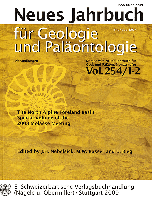
NEUES JAHRBUCH FUR GEOLOGIE UND PALAONTOLOGIE-ABHANDLUNGEN
Bridging the Past and Present of Planetary ScienceNEUES JAHRBUCH FUR GEOLOGIE UND PALAONTOLOGIE-ABHANDLUNGEN, published by E SCHWEIZERBARTSCHE VERLAGSBUCHHANDLUNG, is a distinguished scholarly journal based in Germany that has made significant contributions to the field of Earth and Planetary Sciences with a particular emphasis on Paleontology. With its ISSN: 0077-7749, this journal provides an essential platform for researchers, professionals, and students to explore cutting-edge research and developments that enhance our understanding of geological and paleontological processes. Boasting a robust ranking of #67 out of 113 in Scopus for the category of Earth and Planetary Sciences and achieving a Q3 quartile ranking in Paleontology, it stands as a significant resource in the global academic community. Though not an open-access journal, it offers valuable insights from 1987 onwards, ensuring a comprehensive archive of high-quality research articles published from 1995 to 2024. Its scholarly impact continues to resonate, making it a vital reference point for advancements in the ever-evolving disciplines of geology and paleontology.

BULLETIN OF THE GEOLOGICAL SOCIETY OF DENMARK
Pioneering Research in the Heart of Denmark's GeologyBULLETIN OF THE GEOLOGICAL SOCIETY OF DENMARK, published by the Geological Society of Denmark, serves as a key platform for the dissemination of original research and comprehensive reviews related to geological studies in Denmark and beyond. With an ISSN of 2245-7070, this journal provides a significant avenue for sharing findings that contribute to our understanding of geological processes, resources, and the history of the Earth. Although it operates under traditional access options, the journal encourages a rich scholarly dialogue among researchers, professionals, and students alike. Its impact is evident in the broad scope it covers, catering to diverse areas of geology, including but not limited to sedimentology, paleontology, and environmental geology. By fostering an environment of knowledge sharing, the BULLETIN OF THE GEOLOGICAL SOCIETY OF DENMARK is not just a journal; it is a vital resource for anyone invested in advancing geological science.
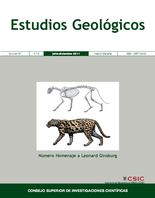
ESTUDIOS GEOLOGICOS-MADRID
Connecting Researchers with Earth’s Secrets Since 1976.ESTUDIOS GEOLOGICOS-MADRID is a prominent journal in the field of geology, published by the esteemed Consejo Superior de Investigaciones Científicas (CSIC) in Spain. Established in 1976, this Open Access journal has been a vital resource for researchers and professionals since its inception. With an impact factor reflecting its contribution to the Earth and Planetary Sciences community, ESTUDIOS GEOLOGICOS-MADRID currently holds a Q3 category ranking in Geology as of 2023, showcasing its relevance and quality within the discipline. The journal publishes a diverse array of geological studies, ensuring wide-reaching access to significant research findings, thereby promoting collaboration and knowledge sharing. Established as a platform for both foundational research and applied geology, this journal fosters academic growth and contributes to understanding the Earth’s processes. Researchers, professionals, and students are encouraged to explore its extensive archive, which includes publications from 1976 to the present. For more information, visit the journal's editorial office at Editorial CSIC, C/VITRUVIO 8, 28006 MADRID, SPAIN.

Gondwana Research
Connecting Experts in Geological Science and InnovationGondwana Research is a premier academic journal published by Elsevier, specializing in the field of geology, with a robust focus on the geological history and processes of the Gondwana supercontinent. With an impressive impact factor and ranking as Q1 in the 2023 Geology category, it stands as a leading platform for disseminating high-quality research. The journal features articles that advance the understanding of Earth and planetary sciences, making significant contributions to geological education and research. Researchers will find its curated content particularly valuable, as it encompasses a wide array of topics including stratigraphy, paleontology, and tectonics, all relevant to both contemporary and historical geological inquiries. Given its substantial reach and esteemed standing—ranked 5th out of 321 in its field—Gondwana Research plays a crucial role in fostering scientific exchange among global experts. Located in the United States with publication continuity from 1997 to 2024, this journal consistently attracts submissions from leading scientists, ensuring that its readership is kept at the forefront of geological discovery and innovation.

Boletin de la Sociedad Geologica Mexicana
Empowering Researchers with Peer-Reviewed Geological InsightsBoletin de la Sociedad Geológica Mexicana is a prestigious open-access journal published by the Universidad Nacional Autónoma de México through its Institute of Geography. As a prominent platform in the field of Earth and Planetary Sciences, this journal has been disseminating valuable research since 1904, facilitating the sharing of knowledge among researchers, professionals, and students alike. With a significant impact on the scientific community, it is categorized in the third quartile (Q3) of Earth and Planetary Sciences, and continues to uphold a commitment to accessible science during its current converged years from 2008 to 2024. Positioned in Mexico, it plays a crucial role in addressing regional geological studies while contributing to global scientific discourse. The journal’s emphasis on high-quality, peer-reviewed articles demonstrates its importance as a reliable resource for advancing geological research and education.
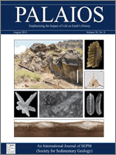
PALAIOS
Discovering Insights from Fossils and StratigraphyPALAIOS is a renowned journal published by the SEPM-Society for Sedimentary Geology, focusing on the interdisciplinary fields of paleontology and sedimentary geology. Established in 1986, this scholarly publication serves as a vital platform for disseminating innovative research and insightful reviews that bridge ecological and evolutionary aspects with paleontological studies. With an impressive track record, the journal has achieved a commendable impact factor and consistently holds a Q2 ranking in both Ecology, Evolution, Behavior and Systematics and Paleontology as of 2023. Researchers and professionals will benefit from the diverse range of studies presented, which encompass fossil analysis, stratigraphy, and the impacts of climate change on past ecosystems. By being at the forefront of research and education in these fields, PALAIOS not only enhances comprehension of historical biodiversity patterns but also informs contemporary ecological theories.
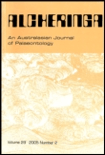
ALCHERINGA
Connecting Researchers to the Pulse of Nature's HistoryALCHERINGA, published by Taylor & Francis Ltd, is a distinguished academic journal that has been at the forefront of research in the fields of ecology, evolution, behavior, systematics, and paleontology since its inception in 1975. With an ISSN of 0311-5518 and E-ISSN 1752-0754, this journal serves as a critical platform for the dissemination of high-quality research, contributing significantly to the understanding of biological and geological sciences. Ranking in the Q3 quartile for both Ecology, Evolution, Behavior and Systematics, as well as Paleontology, ALCHERINGA is well-positioned within the academic community, attracting submissions from researchers across the globe. The journal's Scopus ranks further highlight its relevance, particularly its position in the 51st percentile for Ecology and the 50th percentile for Paleontology. Although it does not operate under an open access model, ALCHERINGA remains committed to providing valuable insights and fostering discussions that are essential for the advancement of these vital scientific disciplines. Researchers, professionals, and students are encouraged to explore the profound implications of the studies published within, making it an indispensable resource for anyone aiming to deepen their expertise in these fields.
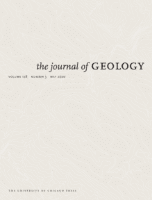
JOURNAL OF GEOLOGY
Advancing Knowledge of Earth's Dynamic Processes.The JOURNAL OF GEOLOGY, published by University of Chicago Press, serves as a premier platform for disseminating groundbreaking research in the field of geology. Established in 1973, this esteemed journal has consistently ranked in the Q2 category in geology, further solidified by its Scopus ranking, where it is positioned at 99 out of 321 in Earth and Planetary Sciences, marking it in the 69th percentile of its category. With an emphasis on innovative and interdisciplinary studies, the journal features peer-reviewed articles that contribute to the understanding of geological processes, earth materials, and environmental interactions. Although it does not currently offer open access, it facilitates broad access through academic institutions to reach a global audience of researchers, professionals, and students striving to advance the knowledge of Earth's history and dynamics. As a vital resource for the geology community, the JOURNAL OF GEOLOGY plays an essential role in fostering scholarly dialogue and advancing both academic inquiry and practical applications in geology.